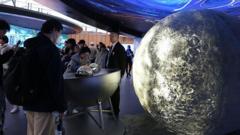In a surprising move, China has extended an olive branch to the US by permitting scientists from six countries, including American institutions, to study moon rocks collected during the Chang'e-5 mission in 2020. This decision comes amidst ongoing trade tensions between the two nations, demonstrating the importance of scientific collaboration despite political disagreements.
**China Reaches Across Borders: Moon Rocks Shared with US Scientists Amid Trade Tensions**

**China Reaches Across Borders: Moon Rocks Shared with US Scientists Amid Trade Tensions**
China opens doors for scientific collaboration by allowing US researchers access to lunar samples, defying trade war constraints.
China's National Space Administration (CNSA) announced that two NASA-funded American institutions will be able to analyze the lunar samples it collected, which CNSA chief Shan Zhongde described as “a shared treasure for all humanity.” While US lawmakers have placed restrictions on joint space efforts with China, experts highlight that the analysis of lunar materials does not pose military risks and should be regarded as a routine international scientific endeavor.
Notably, the backdrop of the trade war remains tense, with punitive tariffs imposed by both nations. The US has levied tariffs as high as 245% on Chinese goods, while China retaliated with tariffs reaching 125% on US exports. Despite former President Trump indicating a possible easing of the trade situation, no substantial negotiations have been confirmed.
The lunar samples from Chang'e-5 are particularly significant; they are believed to be a billion years younger than those retrieved during the Apollo missions, suggesting that volcanic activity on the Moon occurred more recently than previously thought. This fresh insight could reshape scientists’ understanding of the Moon’s geological history.
In 2023, a call for applications by the CNSA to study the Chang'e-5 samples attracted interest from academic institutions worldwide, proving that the desire for knowledge transcends national borders. Among the successful bids were teams from France, Germany, Japan, Pakistan, and the UK, highlighting an expanding network of international scientific partnership.
Shan emphasized that China’s commitment to international space collaboration will continue to grow, hinting at an increasingly proactive role in global space initiatives under China’s Belt and Road Initiative.
Notably, the backdrop of the trade war remains tense, with punitive tariffs imposed by both nations. The US has levied tariffs as high as 245% on Chinese goods, while China retaliated with tariffs reaching 125% on US exports. Despite former President Trump indicating a possible easing of the trade situation, no substantial negotiations have been confirmed.
The lunar samples from Chang'e-5 are particularly significant; they are believed to be a billion years younger than those retrieved during the Apollo missions, suggesting that volcanic activity on the Moon occurred more recently than previously thought. This fresh insight could reshape scientists’ understanding of the Moon’s geological history.
In 2023, a call for applications by the CNSA to study the Chang'e-5 samples attracted interest from academic institutions worldwide, proving that the desire for knowledge transcends national borders. Among the successful bids were teams from France, Germany, Japan, Pakistan, and the UK, highlighting an expanding network of international scientific partnership.
Shan emphasized that China’s commitment to international space collaboration will continue to grow, hinting at an increasingly proactive role in global space initiatives under China’s Belt and Road Initiative.



















